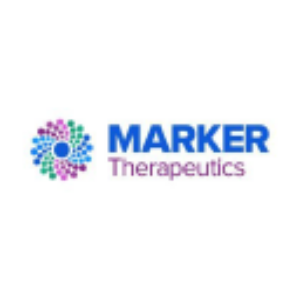Principal Investigator from City of Hope National Medical Center Invited to Present Clinical Data from Marker Therapeutics APOLLO Study at 11th Global Summit on Hematologic Malignancies
Preliminary data from study in patients with lymphoma enrolled at City of Hope National Medical Center was presented at the 11th Global Summit on Hematologic Malignancies in Whistler, BC, Canada
Study participants tolerated initial dose level well and demonstrated durable objective responses after MT-601 treatment
Study participant with Non-Hodgkin’s Lymphoma who relapsed after anti-CD19 CAR T cell therapy remains in complete response nine months after MT-601 treatment
HOUSTON, April 08, 2024 (GLOBE NEWSWIRE) -- Marker Therapeutics, Inc. (Nasdaq: MRKR), a clinical-stage immuno-oncology company focusing on developing next-generation T cell-based immunotherapies for the treatment of hematological malignancies and solid tumor indications, today reported that Geoffrey Shouse, D.O., Ph.D., the Principal Investigator at City of Hope National Medical Center in Duarte, CA, was invited to present his clinical experience from the APOLLO study at the 11th Global Summit on Hematologic Malignancies in Whistler, BC, Canada (April 2-7, 2024). Dr. Shouse provided an overview on the clinical observations obtained at City of Hope on Saturday, April 6, 2024.
The Phase 1 APOLLO study is investigating MT-601, a multi-tumor associated antigen (multiTAA)-specific T cell product, for the treatment of patients with lymphoma who have failed or are ineligible to receive anti-CD19 chimeric antigen receptor (CAR) T cell therapy. Marker previously reported that the first study participant tolerated the treatment well and achieved a complete response (CR) eight weeks after the second infusion of MT-601, which was maintained at the six months follow-up visit (Press Release, September 11, 2023). During the presentation, Dr. Shouse showed that this study participant remains in CR nine months following initial treatment with MT-601. This APOLLO participant had diffuse large B cell lymphoma (DLBCL) and failed four prior lines of therapy, including anti-CD19 CAR T cell therapy. The participant relapsed within 90 days of CAR T cell therapy yet maintained a CR for at least nine months after treatment with MT-601, suggesting that response to MT-601 was more durable compared to CAR T cells in this study participant.
Dr. Shouse’s presentation included data from two additional study participants that have been treated at City of Hope. One of the study participants had transformed follicular NHL and failed a total of 12 lines of therapy including mosunetuzumab (bispecific antibody) for follicular NHL, and Yescarta (anti-CD19 CAR T cell therapy) after transformation into DLBCL. At the time of MT-601 administration, only follicular NHL persisted after the last treatment. Eight weeks after initial infusion with MT-601, this study participant achieved a CR and remains in CR three months following treatment with MT-601. The third patient treated at City of Hope as part of the APOLLO trial presented with DLBCL with cutaneous involvement only and was not eligible for CAR T cell therapy. When evaluated at eight weeks post-treatment, the study participant was in partial response with all lesions decreasing in size including one that has completely resolved.
Dr. Shouse also reported that treatment was well tolerated among all patients with no significant treatment-related adverse events including no reports of cytokine release syndrome (CRS) or immune-effector cell associated neurotoxicity syndrome (ICANS), and that all patients will continue to be monitored closely for long-term treatment effects and durability of response.
“We are encouraged by these clinical results and the potential impact of MT-601 in patients with lymphoma who have relapsed or are ineligible for CAR T cell therapy,” said Geoffrey Shouse, D.O., Ph.D., the Principal Investigator at City of Hope National Medical Center in Duarte, CA. "Observing objective responses in three out of three patients with lymphoma treated with MT-601 at our site is a remarkable and gratifying achievement and we are encouraged by the benefits this therapy has provided to our patients. I am honored to have been invited to showcase these data on MT-601 to leading experts in the field at the 11th Global Summit on Hematologic Malignancies.”
The therapeutic potential of MT-601 is further reinforced by non-clinical data demonstrating that MT-601 is able to eradicate lymphoma cells resistant to anti-CD19 CAR T cells (Press Release, May 31, 2023).
CAR T cell therapy is associated with severe adverse events such as cytokine release syndrome or neurotoxicity, as well as the potential risk of inducing secondary cancers (U.S. Food and Drug Administration, November 28, 2023). MultiTAA-specific T cell therapies have been well-tolerated in clinical trials to date. Marker believes that multiTAA-specific T cells represent a safe alternative to CAR T cells due to their non-genetically engineered approach that selectively expands tumor-specific T cells from a patient’s/donor’s blood without the risk of mutagenesis.
“Although treatment with CD19-targeting CAR T cells is rapidly expanding among hematological malignancies, 40
“Though the number of patients treated to date in our APOLLO study is quite small, observing objective responses in all three study participants treated at City of Hope is encouraging, and highlights the potential benefit of MT-601 in patients with lymphoma. We are continuing to enroll additional patients to hopefully reinforce these promising observations and look forward to treating more participants in this Phase 1 study,” concluded Dr. Vera.
About MT-601
MT-601 utilizes a novel non-genetically modified approach that specifically targets six different tumor antigens upregulated in lymphoma cells (Survivin, PRAME, WT-1, NY-ESO-1, SSX-2, MAGEA-4). Marker is currently investigating MT-601 in the Company-sponsored Phase 1 APOLLO trial (clinicaltrials.gov identifier: NCT05798897) for the treatment of lymphoma patients who are relapsed/refractory after or ineligible to anti-CD19 CAR T cell therapies.
About APOLLO
The APOLLO trial (clinicaltrials.gov Identifier: NCT05798897) is a Phase 1, multicenter, open-label study designed to evaluate the safety and efficacy of MT-601 in participants with relapsed or refractory lymphoma who either failed anti-CD19 chimeric antigen receptor (CAR) T cell therapy or are ineligible for anti-CD19 CAR T cell therapy. The primary objective of this exploratory Phase 1 clinical trial is to evaluate the optimum dose, safety, and preliminary efficacy of MT-601 in participants with various lymphoma subtypes. Under the APOLLO trial, it is anticipated that nine clinical sites across the United States will cumulatively enroll up to approximately 30 participants during the dose escalation phase.
About multiTAA-specific T cells
The multi-tumor associated antigen (multiTAA)-specific T cell platform is a novel, non-genetically modified cell therapy approach that selectively expands tumor-specific T cells from a patient's/donor’s blood capable of recognizing a broad range of tumor antigens. Since multiTAA-specific T cells are not genetically engineered, Marker believes that its product candidates will be easier and less expensive to manufacture, with reduced toxicities, compared to current engineered CAR-T and TCR-based approaches, and may provide patients with meaningful clinical benefits. As a result, Marker believes that its portfolio of T cell therapies has a compelling product profile, as compared to current gene-modified CAR-T and TCR-based therapies.
About Marker Therapeutics, Inc.
Marker Therapeutics, Inc. is a Houston, TX-based clinical-stage immuno-oncology company specializing in the development of next-generation T cell-based immunotherapies for the treatment of hematological malignancies and solid tumors. Clinical trials that enrolled more than 200 patients across various hematological and solid tumor indications showed that the Company’s autologous and allogeneic multiTAA-specific T cell products were well tolerated and demonstrated durable clinical responses. Marker’s goal is to introduce novel T cell therapies to the market and improve patient outcomes. To achieve these objectives, the Company prioritizes the preservation of financial resources and focuses on operational excellence. Marker’s unique T cell platform is strengthened by non-dilutive funding from U.S. state and federal agencies supporting cancer research.
To receive future press releases via email, please visit: https://www.markertherapeutics.com/email-alerts.
Forward-Looking Statements
This release contains forward-looking statements for purposes of the safe harbor provisions of the Private Securities Litigation Reform Act of 1995. Statements in this news release concerning the Company’s expectations, plans, business outlook or future performance, and any other statements concerning assumptions made or expectations as to any future events, conditions, performance or other matters, are “forward-looking statements.” Forward-looking statements include statements regarding our intentions, beliefs, projections, outlook, analyses or current expectations concerning, among other things: our research, development and regulatory activities and expectations relating to our non-engineered multi-tumor antigen specific T cell therapies; the effectiveness of these programs or the possible range of application and potential curative effects and safety in the treatment of diseases; the timing, conduct, interim results announcements and outcomes of our clinical trials of our product candidates, including MT-601 for the treatment of patients with lymphoma. Forward-looking statements are by their nature subject to risks, uncertainties and other factors which could cause actual results to differ materially from those stated in such statements. Such risks, uncertainties and factors include, but are not limited to the risks set forth in the Company’s most recent Form 10-K, 10-Q and other SEC filings which are available through EDGAR at WWW.SEC.GOV. The Company assumes no obligation to update its forward-looking statements whether as a result of new information, future events or otherwise, after the date of this press release except as may be required by law.
Contacts
TIBEREND STRATEGIC ADVISORS, INC.
Investors
Daniel Kontoh-Boateng
(862) 213-1398
dboateng@tiberend.com








